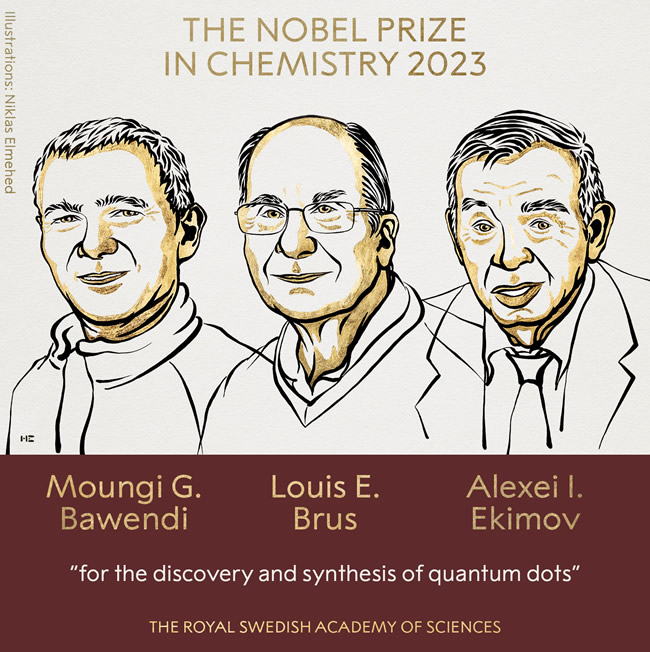« G20 Leaders look forward to Paris 2024 “as a symbol of peace” and “with the participation of all.” | Main | UGC India issues a Public Notice inviting Applications from Eligible Higher Education Institutions (HEIs) for Recognition to offer Programs under Open and Distance Learning (ODL) mode or Online Mode for the Academic Year 2023-24. »
October 4, 2023
The Royal Swedish Academy of Sciences has decided to award the Nobel Prize in Chemistry 2023 to Moungi G. Bawendi, Louis E. Brus, and Alexei I. Ekimov “for the discovery and synthesis of quantum dots.”

Photo: Nobel Prize in Chemistry 2023 joint winners Moungi G. Bawendi, Louis E. Brus, and Alexei I. Ekimov. Image provided by & credit Niklas Elmehed © Nobel Prize Outreach.
Stockholm, October 4, 2023 — The Royal Swedish Academy of Sciences has decided to award the Nobel Prize in Chemistry 2023 to Moungi G. Bawendi, Massachusetts Institute of Technology (MIT), Cambridge, MA, USA; Louis E. Brus, Columbia University, New York, NY, USA; and Alexei I. Ekimov, Nanocrystals Technology Inc., New York, NY, USA “for the discovery and synthesis of quantum dots.”
The Nobel Prize in Chemistry 2023 rewards the discovery and development of quantum dots, nanoparticles so tiny that their size determines their properties. These minor nanotechnology components now spread their light from televisions and LED lamps and can also guide surgeons when they remove tumor tissue, among many other things.
Everyone who studies chemistry learns that an element’s properties are governed by how many electrons it has. However, when matter shrinks to nano-dimensions, quantum phenomena arise; the size of the matter regulates these. The Nobel Laureates in Chemistry 2023 have succeeded in producing particles so small that quantum phenomena determine their properties. The particles, called quantum dots, are now crucial in nanotechnology.
“Quantum dots have many fascinating and unusual properties. Importantly, they have different colors depending on their size,” says Johan Ã…qvist, Chair of the Nobel Committee for Chemistry.
Quantum dots now illuminate computer monitors and television screens based on QLED technology. They also add nuance to the light of some LED lamps, and biochemists and doctors use them to map biological tissue.
Quantum dots are thus bringing the most significant benefit to humankind. Researchers believe that in the future, they could contribute to flexible electronics, tiny sensors, thinner solar cells, and encrypted quantum communication. So, we have just started exploring the potential of these tiny particles.
Source: Nobel Prize Outreach
|GlobalGiants.Com|







Edited & Posted by the Editor | 11:56 AM | Link to this Post







